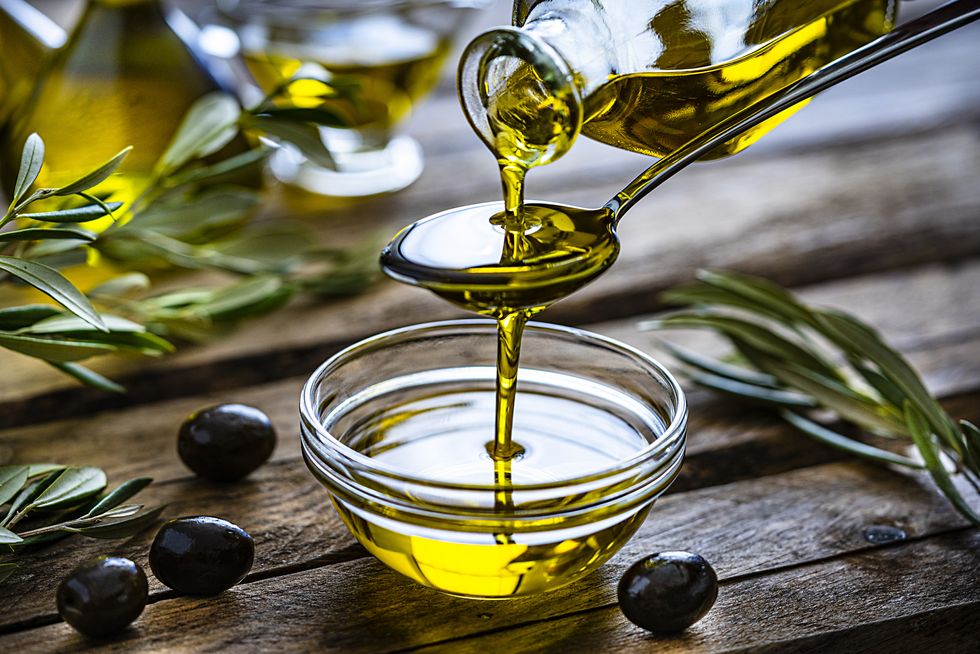
[ad_1]
ICYMI, we’re big on lube. So big, we dedicated an entire week to your lube education via our first-ever Lube Awards. Why? Because we firmly believe that lube is one of—if not the—most important sexcessories you can own. Even if you have full faith in your natural WAP and the sex you’re having is already great, using lube is an easy, quick, convenient, no-fuss way to make it even better. But although there’s an option for pretty much everyone on the market (please bookmark our selection of favorites, if you haven’t already), we’re all human, and sometimes…we run out. Enter: homemade lube, because yes, you might have an all-natural lube alternative sitting in your pantry without you even knowing. And when you’re in a pinch, homemade lube can be a real lifesaver.
Most of the lubes you can buy online or in stores are either silicone, water, or oil based. Oils, specifically, will come in clutch when you’re thinking about homemade lube, so those are mostly what you’ll want to reach for in your moment of need. But just like with actual oil-based lubes, they’re not totally risk-free. Oil isn’t latex condom-compatible, nor is it compatible with silicone toys (it can cause the latex/silicone to erode and break—a thing you def don’t want to happen), so keep that in mind when deciding what kind of sex to have when using homemade lube. If you choose to use oils with silicone toys, make sure to wash them immediately after. As for condoms, it’s better not to risk it. Broken condoms = not worth it. Hold off on penetration and opt for oral sex or mutual masturbation instead.
You should also err on the side of caution with oils if you’re prone to infections, and always, always, always do a patch test on another small part of your skin first. “Since oils are thicker than water-based and silicone-based lubes, they don’t dissolve easily in the skin,” says Cosmo columnist Zachary Zane, author of Boyslut: A Memoir and Manifesto and sex expert for Momentum Intimacy. “This means that it can clog pores, trapping bacteria in the vagina and potentially causing infection. (Think yeast infections, bacterial vaginosis and urinary tract infections.) That said, using it once in a while probably isn’t the end of the world. I’d just make sure to shower with soap and water thoroughly after!”
Now that we’ve covered the safety basics, here’s what to reach for in case of lack-of-lube-emergency.
Aloe Vera
Aloe vera does more than cure a pesky sunburn—it’s a great all-natural lube alternative, too, and it’s the safest option when it comes to latex condoms and silicone toys, since it’s water-based instead of oil-based, says Gigi Engle, ACS certified sexologist and 3Fun sex and relationships expert. “Just be sure to use pure aloe vera and that no other ingredients are included, like alcohol. 100 percent natural is key here, always read the ingredients,” she says.
The only downside to using aloe vera as lube is that, like most water-based options, it tends to dry out pretty quickly, so make sure to re-apply!
Virgin/Unrefined Coconut Oil
If you’re using coconut oil as lube, make sure (like, really really sure) that it’s unrefined or “virgin,” meaning it hasn’t been super-processed or mixed with other ingredients. Engle also says to keep in mind that coconut oil does have anti-fungal properties, so some people may find they get yeast infections, but that depends on how prone you are to them. As always, proceed with caution.
The good news is, coconut oil is ultra-hydrating, so it’s great for your skin and lasts a long time—win-win.
Peanut Oil
Peanut oil should not—I repeat, should not—be used as a lube alternative if one of you has a nut allergy. It’s also, obviously, a cooking oil, which can be hard to wash off and can stain your sheets. The upside to using peanut oil as lube, though, is that it’s less thick than other vegetable oils, says Zane, and when heated up to body temperature, it can be even less thick. “It may feel more like a regular lube that you’d purchase online or at a sex shop,” he says. As always with oils, keep it far away from latex condoms and silicone toys, and shower as soon as you’re done.
Vitamin E Oil
You might have to raid your bathroom cabinet for this one, since it’s more of a skincare staple than a pantry item, but if you’ve got it, vitamin E oil can make a great homemade lube alternative. It’s good for your skin, and particularly great if you struggle with vaginal dryness, says Engle. Like with all other oils, it’s not condom or toy safe, but it is great for anal. “Unlike the vagina, the anus is not self-lubricating,” says Zane, “so when you’re having anal sex, you often need to reapply a ton of lube. That can be really annoying when you’re in the moment. With household oils, you won’t have to reapply!”
Olive Oil
If you cook, chances are you probably have olive oil in your pantry right now, which makes this pick the most convenient. “It’s body safe and works really great for things like vulva and anal massage, masturbating with fingers, glass or steel toys, or oral sex,” says Engle. But try not to get into the habit of making olive oil your only lube option—ultimately it’s a cooking oil, so steer clear of it when it comes to vaginal penetration for all the reasons listed above. Reach for the extra virgin stuff, and make sure to shower thoroughly right after!
[ad_2]
Source link





